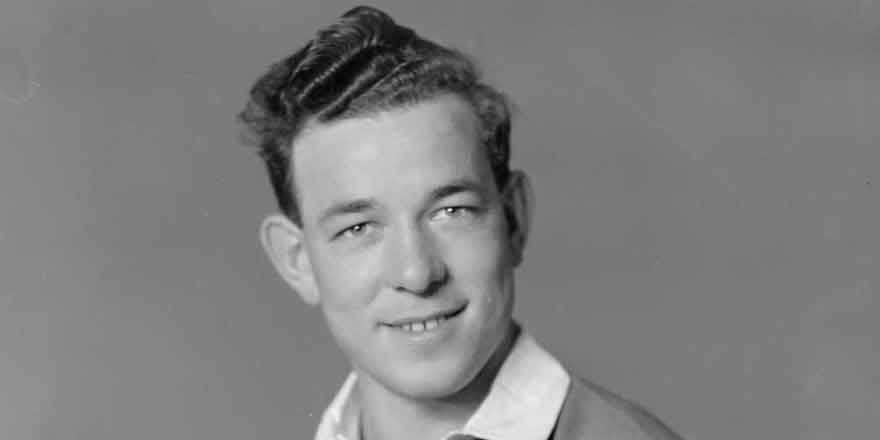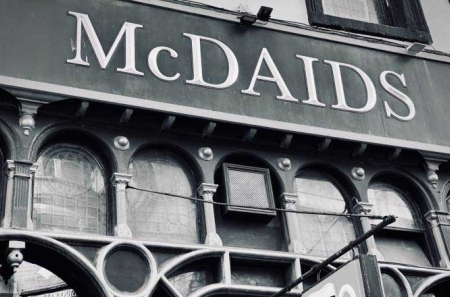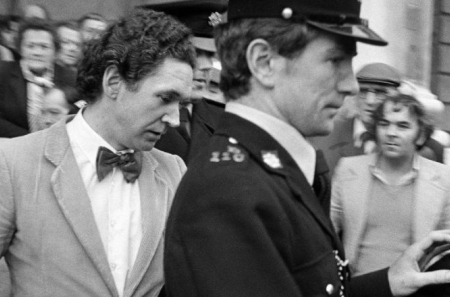
The DIB and the Six Nations: Ireland's first Grand Slam
31 January 2020Hope springs eternal as Ireland approach their opening fixure of the 2020 Six Nations, against Scotland, on Saturday 1 February. To mark Ireland's first ever Grand Slam, in 1948, we publish the DIB entry on Karl Mullen, by Turlough O'Riordan, below.
(Daniel) Karl Mullen (1926–2009), rugby player and gynaecologist, was born on 26 November 1926 in Courtown Harbour, Co. Wexford, one of three sons and seven daughters of Daniel Mullen, an officer of the customs and excise, and his wife Annie (née Hargrove). Daniel had known and greatly respected James Connolly (qv), read much communist literature, and named his son after Karl Marx. After his parents moved to Home Farm Road, Drumcondra, Dublin, Karl was educated at the Dominican St Thomas's Academy, Eccles Street, and the Jesuit Belvedere College, Great Denmark Street (1939–44). He played rugby and cricket at school, soccer with Home Farm, and golf in the summer months. Initially a centre, he became a prop on the Belvedere junior cup team and, after injury to a teammate, hooker on the senior cup team, which lost the Leinster Schools' Cup final to Castleknock College (1944).
In his debut club season (1944/5), Mullen was the youngest forward on the Old Belvedere team that beat Clontarf 12–10 in the Leinster Senior Cup final. (Old Belvedere were the dominant Leinster club of that era, and Mullen won the cup with them again in 1946, 1951 and 1952.) Mullen was first capped for Leinster in autumn 1945, and played on the Leinster team that drew 10–10 with New Zealand Selected Services (17 November 1945), and an Old Belvedere selection that beat them 12–6 (22 December 1945). (The New Zealanders were regarded as the best team in the world, having already beaten English, French and Welsh selections.) He was also chosen for an Irish selection that played the British Army at Ravenhill, Belfast (15 December 1945), and gained further valuable experience in the unofficial 'victory internationals' of spring 1946 (for which Irish caps were not awarded) in losses to England, Wales, France and Scotland.
On 25 January 1947 Mullen made his formal Irish debut (as did Jack Kyle (1936–2014)) in a 12–8 loss to France. A year later he played his first game for the Barbarians in a 9–6 victory over Australia in Cardiff (31 January 1948). After helping Ireland to victory over France on 1 January 1948, at the age of 21 he captained Ireland for the first time, on 14 February 1948, leading them to an 11–10 victory over England at Twickenham, despite England being camped on the Irish line for the last ten minutes of the game. Victory over Scotland at Lansdowne Road on 28 February 1948 assured Ireland of the championship, but the triple crown was still at stake in the final game, on 13 March 1948 against Wales at Ravenhill, Belfast. Ireland had been foiled eight times previously at the same stage by Wales, and Mullen reportedly issued to his teammates the clarion 'this is it boys – boot, bollock and bite' as they took the field (Telegraph, 28 April 2009). The mobile Irish pack were dominant in the loose, with Mullen's hooking integral to securing possession from scrums, and kept possession from a talented Welsh backline to secure a 6–3 victory. Mullen's courageous leadership and tactical nous (remarkable attributes in a 21-year-old) were central to winning Ireland's first triple crown since 1899 (the team had also won what would later be described as the 'grand slam', but beating France was less valued at the time than it would be later). Forward dominance was integral to all four victories, with Mullen basing his tactics on securing and keeping the ball. In an era when captains were integral to selection, coaching and tactics, he went out of his way to credit others, especially his back row of Jim McCarthy, Des O'Brien (qv) and Bill McKay for delivering plentiful possession to the team's fulcrum, Jack Kyle.
Ireland retained the triple crown in 1949 by beating Wales 5–0 in Swansea, ending a run of defeats on Welsh soil lasting fourteen years, with Paul McWeeney (qv) describing Mullen as 'much the most skilful hooker of the present day' (Ir. Times, 11 March 1949). He was also probably the fittest, his mobility and hooking prowess based on conscientious daily fitness training. The following season Ireland suffered from injuries and lost to both England and Wales, the latter securing the triple crown. For the first time in his international career Mullen struggled to impose his hooking skills, but was still chosen to captain the 1950 British Lions tour of New Zealand and Australia, and given complete control of team selection. Nine Irish and thirteen Welsh players – the two dominant teams of the era – formed the core of the squad. The vice-captain, Welsh centre Bleddyn Williams, coached the backs, while Mullen led the forwards, with consensual team selection producing an abundance of team spirit. Mullen lead the Lions in sixteen games on the tour. After appearing in the first two tests against New Zealand (a 9–9 draw and an 8–0 loss), he sustained an ankle injury in the latter game and conceded his place to Dai Davies of Wales. Returning for the second test against Australia (a resounding 24–3 victory), Mullen also played in a semi-official 'British Isles RFU' team against Ceylon during their return journey in September. Mullen's Lions drew record crowds on the tour, and their exhilarating back play (Kyle orchestrating a supremely talented back line) left an indelible mark on New Zealand sporting culture.
Under Mullen's captaincy Ireland regained the international championship in 1951. His last cap came in a 14–3 loss to Wales at Lansdowne Road on 8 March 1952. In twenty-five successive appearances (fifteen as captain), he had secured three international championships and two triple crowns for Ireland in four seasons, their most successful haul of the twentieth century.
Mullen's distinguished rugby career had to be fitted around his medical studies. In 1945 he entered the RCSI, graduating L and LM (RCSI and RCPI) in 1949. Awarded the diploma in obstetrics (1952) and membership of the Royal College of Obstetricians and Gynaecologists (1956), he trained at Sir Patrick Dun's, Jervis Street and the Rotunda hospitals. After serving as senior obstetrics registrar at the Derby City hospital (1953–6) (while playing rugby for Midland Counties), he returned to Dublin to become a consultant obstetrician, based at Mount Carmel Hospital, Churchtown, and developed a considerable private practice. By his retirement in 2002, he was estimated to have delivered over 40,000 babies. A proponent of sex education in schools, he appeared on RTÉ's Seven days(December 1970) outlining various methods of birth control and calling for a more honest and realistic approach to artificial contraception.
Largely because of his links to the Charitable Infirmary, Jervis Street, which through the 1960s emerged as Dublin's principal treatment centre for drug addiction, in December 1968 Mullen was appointed by the government to chair a working party to examine the issue of drug abuse in conjunction with the Medico-Social Research Board. An interim report in November 1969 urged a meaningful legislative response and the development of an outpatient clinic for addicts. The later Report of a working party on drug abuse (1971) drew widely on consultations with medical and healthcare professionals, the Gardaí, and courts services to produce recommendations to discourage drug use and deliver effective rehabilitation services.
Mullen maintained his interest in and links with Irish rugby, and with Ham Lambert (qv) was the driving force in establishing the Irish Wolfhounds RFC (1958), an Irish touring side modelled on the Barbarians FC; Mullen was their first honorary secretary and president (1984–5). He was also a Leinster selector (1961–4), chairman of the Irish selectors (1961–4), a member of the IRFU general committee and advisory laws committee (1963), and president of the IRFU Leinster branch (1963–4). He was appointed president of the international medical congress on sports injuries, held in Dublin to mark the IRFU's centenary (1974–5). In the early 1970s, Mullen coached the Belvedere College team, and was the driving force behind Old Belvedere's sevens tournament; he was also the club's chairman (1970), president (1973–4), and director of rugby (1973–5).
Mullen married (30 April 1952) Doreen Kilbride (d. 2008) in Donnybrook, Dublin, interrupting their honeymoon to play for Old Belvedere in the Leinster Senior Cup final. Doreen was an accomplished soprano who was prominent on the Dublin stage and in feis ceoil and other musical competitions during the late 1940s and early 1950s. She also raised funds for various charities and was a celebrated hostess, gathering together in her home leading figures from the arts, sport and medicine. The Mullens had eight children (three boys and five girls), which Karl claimed was the best possible advertisement for his profession (Ir. Times, 2 May 2009). In 1975 they moved home from Altamount, Dundrum, Co. Dublin, to Tulfarris House, Blessington, Co. Wicklow, adjacent to Poulaphouca reservoir, where they farmed and bred Irish draught horses. An assiduous collector of Irish art, Mullen bought works by artists such as Louis Le Brocquy (1916–2012), Patrick Scott (1921–2014), Edward McGuire (qv), Jack Yeats (qv), Walter Osborne (qv), William Orpen (qv) and Edward Delaney (qv), and opened a public art gallery at Tulfarris, which included a restaurant and cafe. In 1985 he sold the property and much of his art collection and moved to Kilcullen, Co. Kildare. Involved with the Ireland Funds, established by his close friend Tony O'Reilly (b. 1936), Mullen was chairman of the Rossyln Park fund (1983), a fundraising precursor to the Rehab Group, and a founder member of the Irish Hospital Consultants Association (1989). An avid golfer since his teens, he was a prominent amateur competitor as a member of Milltown Golf Club and a founder member of Rathsallagh Golf Club.
Widely revered within rugby circles, Mullen was adjudged the outstanding hooker of his time by Edmund Van Esbeck (Story, 117). Mullen, though, was an enduringly modest man, downplaying his achievements and reputation as one of the greatest hookers and captains in world rugby, and emphasising instead the friendships garnered from his rugby career. He maintained close links with many of his rugby teammates, notably Jack Kyle, who described him as 'quietly authoritative and a superb technical player' (Telegraph, 27 April 2009). He was one of eight surviving members of the 1948 team to witness Ireland's second grand slam on 21 March 2009. Only weeks later, Mullen, having suffered from a long illness, died on 27 April 2009 at his home, Gilltown Lodge, Kilcullen, Co. Kildare.
GRO (birth cert.); Belvederian (1939–46), passim; Ir. Times, 12 Nov., 6, 24 Dec. 1945; 11, 14 Mar. 1949; 20 Mar., 14, 15 Aug. 1950; 29 Mar. 1952; 14 Apr. 1953; 14 Apr., 5 May, 4 Aug., 7 Sept. 1956; 11 June 1962; 6 June 1963; 27 June 1964; 15 Feb., 13 Dec. 1967; 5 Nov. 1969; 26 Mar., 25 Nov. 1970; 16 Oct. 1972; 10 July 1973; 29 Aug., 8 Oct. 1974; 7 Jan. 1975; 25 Feb. 1978; 1 Sept. 1979; 4 June 1983; 22 Nov. 1994; Medical Register 1954; Medico-Social Research Board, first report (1969); Medical Directory 1970; Nigel Starmer-Smith, The Barbarians: the official history of the Barbarian Football Club (1977); Edmund Van Esbeck, Ten out of fifty: a chronicle of Old Belvedere Rugby Football Club 1930–80 (1980); id., The story of Irish rugby (1986), passim; Sean Diffley, Rugby's golden year: the unique grand slam of 1948 (1998); Times, 26 Mar. 2003; 4 May 2009; Guardian, 30 Mar. 2003; 1 May 2009; 'Karl Mullen' (by himself) in Oliver Murphy (ed.), Belvedere's rugby heroes (2006); Sunday Independent, 1 June 2008; Independent (London), 28 April 2009; Telegraph, 27 Apr. 2009; Lancet, ccclxxiii (6 June 2009), obituary; 'Rugby Football in New Zealand: British Isles Tour (1950)', 7 Aug. 2013, www.youtube.com/watch?v=8gktEJLnRaE; Tom English, No borders: playing rugby for Ireland (2015); www.lionsrugby.com; www.dominicancollegeppu.ie (internet sources accessed May 2016)
A new entry, added to the DIB online, June 2016
The Dictionary now comprises over 10,600 lives.
Follow the DIB on Twitter @DIB_RIA – where we post topical biographies.
All biographies are available at: dib.cambridge.org
© 2019 Royal Irish Academy. All rights reserved. Not for commercial use or unauthorized distribution. Learn more about DIB copyright and permissions.
Image courtest of Wikicommons



